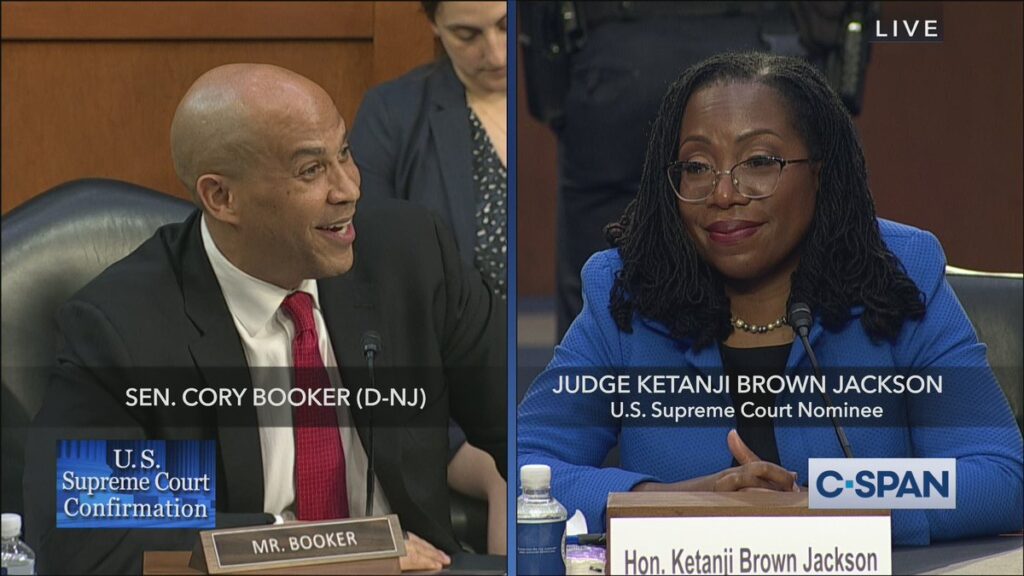Friday
As Senate Republicans went after Supreme Court nominee Judge Ketanji Brown Jackson in hearings that Washington Post’s Eugene Robinson notes were characterized by “racism, sexism, feigned outrage and general ugliness,” New Jersey’s Cory Booker (the Senate’s one Black senator) turned to a Langston Hughes poem, “Let America Be America Again,” to capture the true significance of the event. Poetry helps us regain our bearings when other uses of language fail.
Booker quoted the poem’s penultimate stanza as he celebrated Judge Jackson. With her probable elevation to the Supreme Court, Booker was saying, the founding dream of America will come a little closer to fulfillment for African Americans:
O, yes,
I say it plain,
America never was America to me,
And yet I swear this oath—
America will be!
The poem, like “I Too Sing America,” serves as both an homage and a corrective to Walt Whitman’s Song of Myself, in which Whitman uses long lists to capture the spirit of America. After each of the first three stanzas of “Let America Be America Again,” after invoking America’s founding ideal, Hughes delivers a devastating reality check in the form of a parenthetical aside:
Let America be America again.
Let it be the dream it used to be.
Let it be the pioneer on the plain
Seeking a home where he himself is free.(America never was America to me.)
Let America be the dream the dreamers dreamed—
Let it be that great strong land of love
Where never kings connive nor tyrants scheme
That any man be crushed by one above.(It never was America to me.)
O, let my land be a land where Liberty
Is crowned with no false patriotic wreath,
But opportunity is real, and life is free,
Equality is in the air we breathe.(There’s never been equality for me,
Nor freedom in this “homeland of the free.”)
The following two-line stanza sets up two questions, one from an exploiter tangled in “that ancient endless chain/ Of profit, power, gain, of grab the land!” (the first question) and one from poor Whites, Blacks, Indians and poor immigrants (the second question):
Say, who are you that mumbles in the dark?
And who are you that draws your veil across the stars?
In Wednesday’s post, I cited another Langston Hughes poem that applies to Judge Jackson’s remarkable rise, not to mention the rise of Black women generally. “Mother to Son” captures the determination to keep keeping on, despite all the obstacles that one encounters. Yesterday on Morning Joe I heard the Rev. Al Sharpton reference the poem, talking about how life for Jackson has been “no crystal stair.” And indeed, at one point in the hearings Jackson herself—when asked how she would counsel young women in color—replied with the word that best characterizes the poem: “perseverance.”
Returning to “Let America Be America Again,” Hughes’s Whitmanesque list (although he doesn’t couch his list in free verse and he even has some rhymes and half rhymes) makes it clear he’s not only talking about African Americans but all those in our history who have been oppressed and marginalized. And because, as much as any other American author, Hughes is obsessed with the American dream, which he often refers to as “the dream deferred,” he makes clear how all of these figures are unified by their dreaming. Thus, even though they have all suffered because America has fallen short of its ideals (he provides multiple examples), nevertheless the hope lives on:
Yet I’m the one who dreamt our basic dream
In the Old World while still a serf of kings,
Who dreamt a dream so strong, so brave, so true,
That even yet its mighty daring sings
In every brick and stone, in every furrow turned
That’s made America the land it has become.
O, I’m the man who sailed those early seas
In search of what I meant to be my home—
For I’m the one who left dark Ireland’s shore,
And Poland’s plain, and England’s grassy lea,
And torn from Black Africa’s strand I came
To build a “homeland of the free.
Even as he says “free,” Hughes realizes the word sounds hollow. It’s “a dream that’s almost dead today,” he admits. But “almost” is not “entirely” and the poem ends on a note of hope.
That’s why Booker quoted it and why he was so excited to see Jackson sitting in front of him. At a time when the Senate has reached a stagnant gridlock and when the forces of reaction appear able to shut down any forward movement in the country as a whole, he felt hope stir.
Will his citing the poem do any good? Republican leader Mitch McConnell is calling Jackson a radical leftist and vowing to vote against her, so the Hughes poem didn’t sway him. I think, however, Booker quoting Hughes reminded people of the high ground after the sordid tactics of the Ted Cruzes, Josh Hawleys, and Marsha Blackburns (my own senator, I say to my shame). By reminding people of the momentousness of the dream, the poem may be enough to get all the Democrats to vote for her (including conservative Joe Manchin) and maybe even pick up a handful of Republican votes.
Poems often have the ability to put us in touch with our best selves. Some GOP members of Congress may not be altogether deaf to their better angels.


